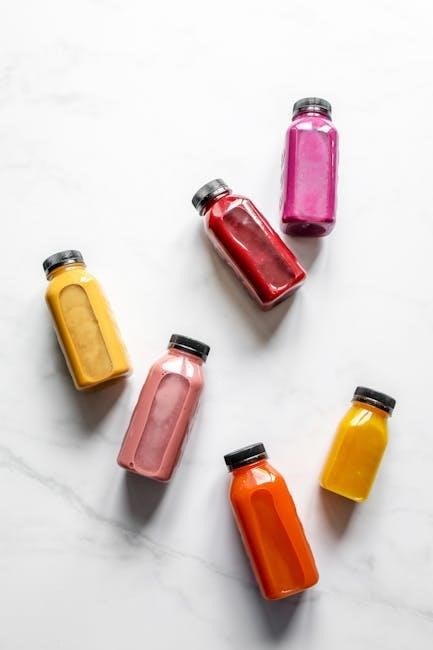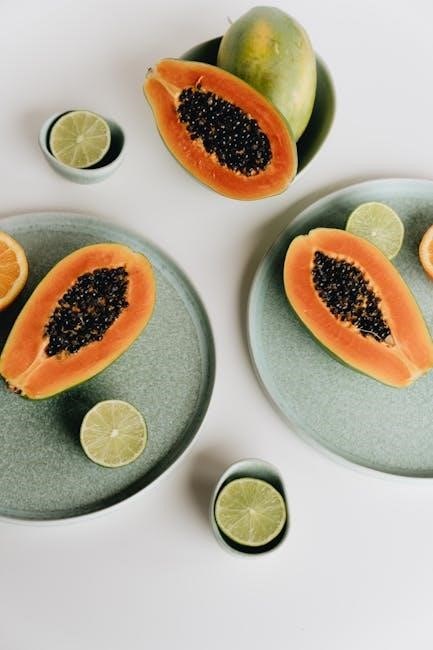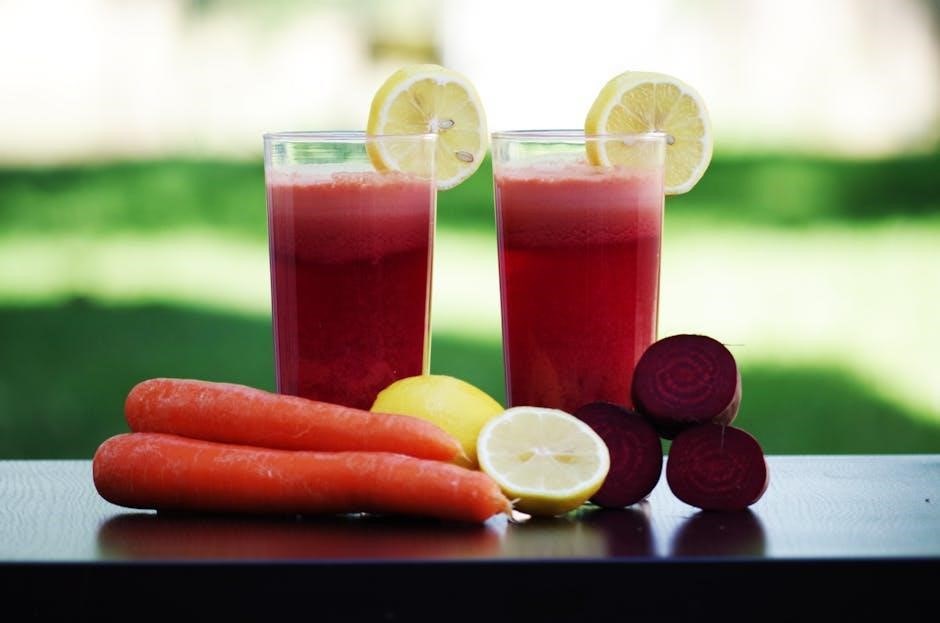The 21-Day Detox Diet Plan is a structured program designed to help cleanse and rejuvenate the body through nutrient-dense foods and lifestyle changes. It focuses on eliminating harmful substances, improving digestion, and boosting energy levels. This plan is tailored to support the body’s natural detoxification processes, promoting overall health and well-being. By following this program, individuals can experience benefits like weight loss, enhanced mental clarity, and reduced inflammation. The plan is divided into three phases, each with specific guidelines to ensure a safe and effective detox journey.
1.1 What is a Detox Diet?
A detox diet is a short-term dietary intervention aimed at cleansing the body by eliminating harmful substances and promoting nutrient intake. It focuses on whole, unprocessed foods like fruits, vegetables, and lean proteins to support the body’s natural detoxification processes. The goal is to enhance digestion, reduce inflammation, and improve overall well-being through targeted nutrition.
1.2 The Concept of a 21-Day Plan
The 21-day plan is designed to provide a balanced and sustainable approach to detoxification. It allows the body to gradually adapt to new dietary habits, ensuring a safe and effective cleanse. This duration supports the body’s natural rhythms, making it easier to adopt healthy practices and maintain them beyond the detox period for long-term benefits and overall wellness.
1.3 Benefits of a Structured Detox Program
A structured detox program offers numerous benefits, including improved digestion, increased energy levels, and reduced inflammation. It helps reset eating habits, enhancing mental clarity and focus. The program supports the body’s natural detoxification processes, promoting a healthier lifestyle and overall wellness. By following a clear plan, individuals can achieve sustainable results and maintain long-term health benefits effectively.

Benefits of the 21 Day Detox Diet
The 21-Day Detox Diet promotes improved digestion, increased energy, and weight loss. It enhances mental clarity, reduces inflammation, and supports skin health, fostering overall well-being naturally.
2.1 Improved Digestion and Energy Levels
The 21-Day Detox Diet helps eliminate inflammatory foods, promoting smoother digestion and reducing bloating. By incorporating liver-supporting nutrients and detox-friendly herbs, the plan enhances energy levels and vitality, ensuring a refreshed and rejuvenated body throughout the program.
2.2 Weight Loss and Metabolism Boost
The 21-Day Detox Diet Plan promotes sustainable weight loss by eliminating sugars and processed foods, which slows metabolism. By focusing on nutrient-dense foods, the plan helps reset metabolism, boosting fat-burning efficiency and supporting long-term weight management. This structured approach ensures a healthier relationship with food, leading to a slimmer, more energized body.
2.3 Enhanced Mental Clarity and Focus
The 21-Day Detox Diet Plan helps improve mental clarity by reducing toxins and inflammation that fog the brain. Nutrient-rich foods supply essential vitamins and antioxidants, supporting brain health. The plan’s focus on whole, unprocessed foods and balanced metabolism promotes stable energy, sharper focus, and a clearer mind, enhancing overall cognitive function and productivity.
2.4 Reduced Inflammation and Skin Health
The 21-Day Detox Diet Plan reduces inflammation by eliminating triggers like processed foods and sugars. It introduces anti-inflammatory foods rich in omega-3s and antioxidants, promoting healthier skin. The plan supports detox pathways, improving skin clarity and reducing conditions like acne. By addressing inflammation, it enhances overall skin health and well-being, fostering a radiant, rejuvenated appearance naturally.

Foods to Include in the 21 Day Detox Diet
Fresh fruits, vegetables, whole grains, lean proteins, and healthy fats are essential. These foods support detox pathways, reduce inflammation, and promote overall well-being during the cleanse.
3.1 Fresh Fruits and Vegetables
Fresh fruits and vegetables are cornerstone foods in a detox diet, rich in vitamins, minerals, and antioxidants. They support liver and kidney function, aiding toxin elimination. Leafy greens, berries, and citrus fruits are particularly beneficial. Aim for variety to maximize nutrient intake and include organic options to avoid pesticide exposure. Wash thoroughly before consumption.
3;2 Whole Grains and Legumes
Whole grains and legumes are rich in fiber, vitamins, and minerals, supporting digestion and detoxification. Quinoa, brown rice, lentils, and chickpeas are excellent choices. They provide sustained energy and help regulate blood sugar levels. Incorporating these foods aids in eliminating toxins and supports the body’s natural cleansing processes during the detox program.
3.3 Lean Proteins and Healthy Fats
Lean proteins like chicken, fish, and tofu provide essential amino acids for repair and detoxification. Healthy fats, such as avocados, nuts, and olive oil, support liver function and nutrient absorption. These foods are crucial for maintaining energy levels and promoting the body’s natural detox processes without adding harmful toxins.
3.4 Herbs, Spices, and Detox-Supporting Foods
Herbs like turmeric, ginger, and parsley aid digestion and reduce inflammation. Spices such as cumin and cinnamon support detox pathways. Incorporate cruciferous vegetables like broccoli and kale, which promote liver function. Fermented foods like kimchi and sauerkraut boost gut health, enhancing the body’s ability to eliminate toxins naturally and efficiently during the detox process.
Foods to Avoid During the Detox
Eliminate sugary, processed, and high-sodium foods, as well as alcohol, caffeine, and fried items. Avoid gluten and dairy to reduce inflammation and support detoxification effectively.
4.1 Sugary and Processed Foods
Eliminate sugary and processed foods, including candies, sodas, and packaged snacks, as they cause inflammation and hinder detoxification. These foods disrupt blood sugar balance and slow down the body’s natural cleansing processes. Opt for whole, nutrient-dense alternatives like fruits, vegetables, and lean proteins to support your detox goals and overall health.
4.2 Dairy and Gluten Products
Dairy and gluten products are often inflammatory and can hinder detox efforts. They may cause digestive discomfort and slow down the body’s natural cleansing processes. Avoid milk, cheese, wheat, and barley to reduce inflammation and support liver function. Opt for gluten-free alternatives and non-dairy options like almond milk or coconut products during the detox period.
4.3 Alcohol and Caffeine
Alcohol and caffeine are detrimental to detox efforts as they dehydrate the body and burden the liver. Alcohol disrupts metabolism, while caffeine can cause energy crashes. Eliminating these during the detox period supports clearer skin, better digestion, and enhanced mental clarity. Herbal teas and water are recommended to stay hydrated and maintain energy levels naturally.
4.4 Fried and High-Sodium Foods
Fried foods and high-sodium options are rich in unhealthy fats and preservatives, which can slow detox progress and lead to bloating. These foods strain digestion and contribute to fluid retention. Avoiding them helps reduce inflammation, improve digestion, and support weight loss. Opt for baked, steamed, or grilled alternatives seasoned with herbs and spices for flavor without the negative effects.

Sample 21 Day Detox Meal Plan
This structured meal plan guides you through three phases: introduction to detox foods, balancing macronutrients, and finalizing detox. Each phase focuses on nutrient-dense meals to support your detox journey.
Start with low-glycemic fruits like berries, apples, and grapefruit, which are rich in antioxidants and fiber. Incorporate leafy greens, cruciferous vegetables, and cleansing smoothies. Focus on eliminating inflammatory foods and introducing nutrient-dense options to support liver function and digestion. This phase sets the foundation for a successful detox journey.
5.2 Day 8-14: Balancing Macronutrients
Days 8-14 focus on balancing proteins, healthy fats, and complex carbs to stabilize energy levels. Include lean proteins like fish and tofu, whole grains such as quinoa and brown rice, and healthy fats from avocados and nuts. This phase ensures sustained nutrition, supports metabolism, and helps maintain a balanced diet while continuing detox benefits.
5.3 Day 15-21: Finalizing the Detox
Days 15-21 focus on intensifying cleansing and preparing for a post-detox lifestyle. Incorporate more detox-supporting foods like leafy greens, cruciferous vegetables, and herbs such as turmeric and ginger. Emphasize hydration and consider incorporating gentle cleansing practices like herbal teas or light exercise. This phase aims to maximize detox benefits and transition smoothly into a healthier diet.
Importance of Hydration and Supplements
Hydration is crucial for flushing toxins, while supplements like milk thistle and vitamin C support liver function. Herbal teas and electrolytes enhance detox efficiency and replenish nutrients.
6.1 Water and Herbal Teas
Drinking plenty of water is essential for flushing out toxins and supporting digestion. Herbal teas like peppermint, chamomile, and dandelion root tea aid digestion, reduce inflammation, and provide antioxidants. Aim for at least 8-10 glasses of water daily and incorporate 2-3 cups of herbal tea to enhance detoxification and overall well-being during the plan.
6.2 Detox-Supporting Supplements
Detox-supporting supplements like milk thistle, spirulina, and probiotics help enhance liver function, promote toxin elimination, and support gut health. These supplements are designed to boost the body’s natural detox processes, improving overall well-being. Consult a healthcare professional before adding any supplements to ensure they align with your health goals and the detox plan.
Exercise and Lifestyle Tips
Gentle exercises like yoga and walking support detoxification by improving circulation and promoting lymphatic drainage. Adequate sleep and stress management are crucial for optimal detox results and overall well-being.
7.1 Gentle Exercises for Detox
Gentle exercises like yoga, walking, and stretching support detoxification by improving circulation and lymphatic drainage. These activities enhance the body’s natural cleansing processes without causing undue stress, promoting overall well-being during the detox period.
7.2 Sleep and Stress Management
Quality sleep and effective stress management are crucial during detox. Aim for 7-8 hours of sleep nightly to aid toxin elimination and cellular repair. Practices like meditation, deep breathing, and journaling help reduce stress, supporting the body’s natural detox processes and promoting overall health during the 21-day plan.

Common Myths About Detox Diets
Detox diets are often misunderstood, with myths claiming they rapidly remove toxins or promote extreme weight loss. Many believe detoxing requires harsh restrictions, but it’s about nourishing the body with whole foods and healthy habits to support natural detoxification processes, not quick fixes or unrealistic expectations.
8.1 The Role of the Liver and Kidneys
Your liver and kidneys are your body’s primary detox organs, working tirelessly to filter toxins and waste. The liver processes harmful substances, while the kidneys excrete them through urine. A well-designed detox plan supports these organs with nutrient-rich foods, ensuring they function optimally. Without proper nutrition, their efficiency can decline, hindering detox efforts.
8.2 Debunking Fad Diet Claims
Fad diets often promise rapid results but lack scientific backing and sustainability. They may restrict essential nutrients, leading to nutrient deficiencies and metabolic slowdowns. True detoxification relies on supporting the body’s natural processes, not quick fixes. The liver and kidneys already detoxify; diets should enhance, not replace, these functions with balanced nutrition and healthy habits.
Frequently Asked Questions
This section addresses common questions about the 21-Day Detox Diet Plan, providing clarity on safety, handling cravings, and long-term sustainability. Find answers here!
9.1 Is the Detox Diet Safe for Everyone?
The 21-Day Detox Diet is generally safe for most individuals, promoting healthy eating habits and natural cleansing. However, certain groups, such as those with chronic conditions or nutritional deficiencies, should consult a healthcare provider before starting. Moderation and awareness of individual health needs are crucial for a safe detox experience.
9.2 How to Handle Cravings?
Managing cravings during the detox involves healthy substitutions, hydration, and mindful eating. Opt for nutrient-dense snacks like fruits or nuts to satisfy hunger. Drinking water and herbal teas can reduce cravings. Planning meals in advance and seeking support from a community or guide can also help maintain discipline and focus on your detox goals effectively.
9.3 Can I Follow the Diet Long-Term?
The 21-Day Detox Diet can be adapted for long-term use by incorporating balanced, nutrient-rich meals. While the initial plan is designed for detoxification, sustainable eating habits can be maintained by continuing to focus on whole foods, avoiding processed items, and consulting a nutritionist for personalized adjustments to ensure variety and nutritional adequacy over time.
Tracking Progress and Results
Monitor your journey by documenting food intake, symptoms, and energy levels in a journal. Regularly measure weight, body metrics, and track improvements in digestion and overall well-being.
10.1 Keeping a Food and Symptom Journal
Track your daily food intake, symptoms, and energy levels to monitor progress. Note portion sizes, meal times, and any physical or mental changes. This journal helps identify patterns, making informed decisions about your diet and lifestyle. Reflecting on your entries can reveal improvements in digestion, reduced cravings, and overall well-being, helping you stay motivated and informed throughout your detox journey.
10.2 Measuring Weight and Body Metrics
Regularly track your weight, body fat percentage, and measurements to monitor progress. Take weekly weigh-ins and note changes in inches or centimeters. This data helps assess fat loss and muscle retention. Use progress photos to visualize changes. These metrics provide insights into your detox journey, helping you stay motivated and understand your body’s transformation beyond the scale.
Maintaining a Healthy Diet After Detox
After completing the detox, focus on maintaining balanced nutrition by incorporating whole, nutrient-rich foods. Gradually reintroduce foods while avoiding processed and sugary items. Listen to your body and adjust your diet to sustain long-term health and energy. This approach ensures the benefits of detox are preserved and enhanced over time.
11.1 Gradual Reintroduction of Foods
After detox, reintroduce foods slowly to monitor reactions. Start with small portions of gluten, dairy, or processed items. Observe digestion, energy, and skin health for any adverse effects. This method helps identify sensitivities and ensures a smooth transition to a balanced diet without compromising detox benefits. It supports long-term health and wellness effectively.
11.2 Long-Term Nutrition and Wellness
Long-term nutrition focuses on maintaining healthy habits post-detox. Emphasize whole, nutrient-dense foods, stay hydrated, and practice mindful eating. Regular physical activity and stress management are key. Aim to sustain balanced eating patterns, avoiding extremes, to promote lasting energy, vitality, and overall well-being. This approach ensures the detox benefits translate into a healthier lifestyle sustainably.
Completing the 21-Day Detox Diet Plan successfully enhances overall health and energy levels. The structured approach promotes sustainable well-being, ensuring long-term benefits through balanced nutrition and mindful habits.
12.1 Summary of the 21-Day Detox Plan
The 21-Day Detox Plan is a comprehensive, three-phase program designed to eliminate harmful substances, improve digestion, and boost energy. It focuses on nutrient-dense foods, hydration, and lifestyle adjustments to support the body’s natural detox processes. By following the structured guidelines, participants can achieve improved health, enhanced well-being, and a foundation for long-term wellness.
12.2 Final Thoughts on Detox Diets
The 21-Day Detox Plan is a transformative approach to cleansing and rejuvenating the body. By focusing on nutrient-dense foods, hydration, and lifestyle changes, it empowers individuals to achieve improved health and well-being. This structured program not only supports the body’s natural detox processes but also encourages sustainable habits for long-term wellness and vitality.
13.2 Tools for Meal Planning and Tracking
Additional Resources
Explore recommended books, websites, and tools for meal planning and tracking to support your detox journey. These resources offer valuable insights and practical guides for long-term success.

Leave a Reply
You must be logged in to post a comment.